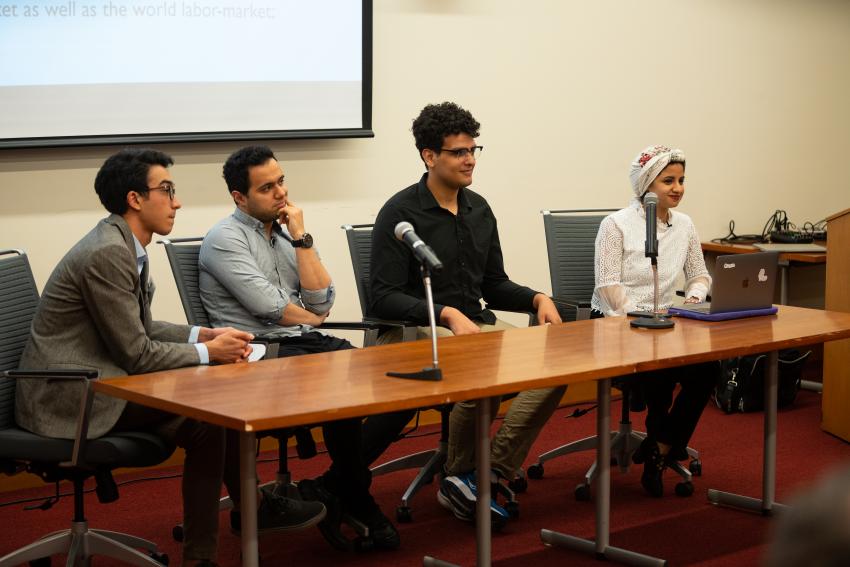Egyptian Students Visit Campus on April 21 for STEM Showcase

At the Egyptian STEM Student Showcase at Arcadia University on Thursday, April 21, students from Egypt shared how they came to attend top U.S. colleges and universities, thanks in part to a program developed with the help of Arcadia faculty.
Starting in 2011, Arcadia faculty members worked with the 21st Century Partnership for STEM Education (21PSTEM), a Philadelphia nonprofit, to develop curricula for Egyptian schools specializing in science, technology, engineering, and mathematics, or STEM. Also partnering on the project were the Franklin Institute’s Science Leadership Academy–SLA teachers trained Egyptian teachers, mostly in Egypt–and the Teaching Institute for Excellence in STEM.
Dr. Deborah Pomeroy, professor emerita at Arcadia, served as lead curriculum designer.
“Along with TIES, which designed the five semester Capstones, we designed the entire high school curriculum for the Ministry of Education,” says F. Joseph Merlino ’88 MEd, president of 21PSTEM. “It was a rare opportunity because the schools were exempt from all testing mandates.” The original initiative was funded by a $30 million grant from the U.S. Agency for International Development (USAID).
“We started with one new high school 45 minutes outside of Cairo in the middle of a barren tract of land. The school drew kids from all over the country–the top-level students,” Merlino recalls. Today, the curricula have been implemented in 19 Egyptian STEM high schools–all boarding schools, serving both boys and girls. With 450 youth in each school, nearly 9,000 students are learning within the curriculum.
“We’ve found that scores of the students have since graduated from the STEM schools and made their way to the states, usually on full-boat scholarships,” Merlino says. Half a dozen of those students will present their stories April 21.
He noted the event is particularly relevant to potential donors who are interested in transformational education. Merlino also is encouraging Arcadia leadership to attend, along with others in the education field. “Lessons from this project can be applied here in the U.S.,” he notes, adding that the project “demonstrates that it is possible to fundamentally rethink and redesign the purpose of high schools in the United States to make them more relevant to students living in the 21st century.”
Arcadia faculty and staff also are contributing to a second phase of the project, which will develop a new STEM teacher preparation program in Egypt. Supported by an additional $24 million USAID contract, they are again working with 21PSTEM to design from the ground-up 20 graduate courses and up to 141 new undergraduate courses for five large public universities in Egypt.
Arcadia faculty and staff involved in the project include Dr. Augusto Z. Macalalag, associate professor and Arcadia team program director, School of Education; Kim Dean, assistant professor of Education; Dr. Ellen Skilton, professor of Education; and Tran T. Chau, program coordinator.
Merlino says plans are underway to expand the number of STEM schools in the curriculum project and continue to develop new courses and provide professional development to teachers and professors over the next few

